Author: Jack, BlockBeats
These days, a plea letter addressed to the United States District Court for the Western District of Washington has been circulating widely within the industry.
On April 30th, Binance founder CZ will face the final judgment in this court. According to the US sentencing guidelines, he faces a recommended sentence of 12 to 18 months, but there are also reports that he may face a 36-month prison sentence. This Tuesday, CZ submitted a letter to Judge Jones, who is responsible for this case, apologizing for his actions and acknowledging that he should take full responsibility. In addition to CZ's letter, there are a total of 161 plea letters from important figures such as family members, friends, officials, and employees, among which a handwritten letter from He Yi is the most eye-catching.
The entire letter spans 3 pages and is filled with deep affection for CZ and Binance. He Yi recalled the 10 years of ups and downs she and CZ have experienced in the industry, especially the 6 years of painstaking effort in building Binance together, including some little-known details that are a microcosm of CZ's and Binance's actions. Many industry veterans expressed deep emotion after reading it on social media, reflecting on how "many things have changed over the years, but you are still the same 'big sister'."
I remember one evening in June last year, a message was sent in the editorial WeChat group: "Big sister is very angry."
That day, Bloomberg published an interview with He Yi, marking the first time that a complete article about the woman behind the billion-dollar unicorn was covered by a mainstream Western financial media outlet. Chinese media outlets translated and shared the interview. The article was titled "The Most Powerful Woman in the Crypto Field Speaks Out in the Crisis of Binance". After careful reading, people found that Bloomberg seemed to not fully recognize the "superpowers" that this "Binance female powerhouse" possesses and displays in the crypto industry.
In the article, He Yi was portrayed as someone who "has been avoiding the gaze of authority for six years" and is now "trapped in the crypto empire" as a female executive, with her influence in the crypto world largely stemming from her relationship with CZ. Bloomberg even used the relationship between FTX founder SBF and its executive Caroline to imply this legendary couple in the crypto industry, while refraining from commenting on the claims that He Yi "brought CZ into the circle" and "joined Binance based on her abilities".
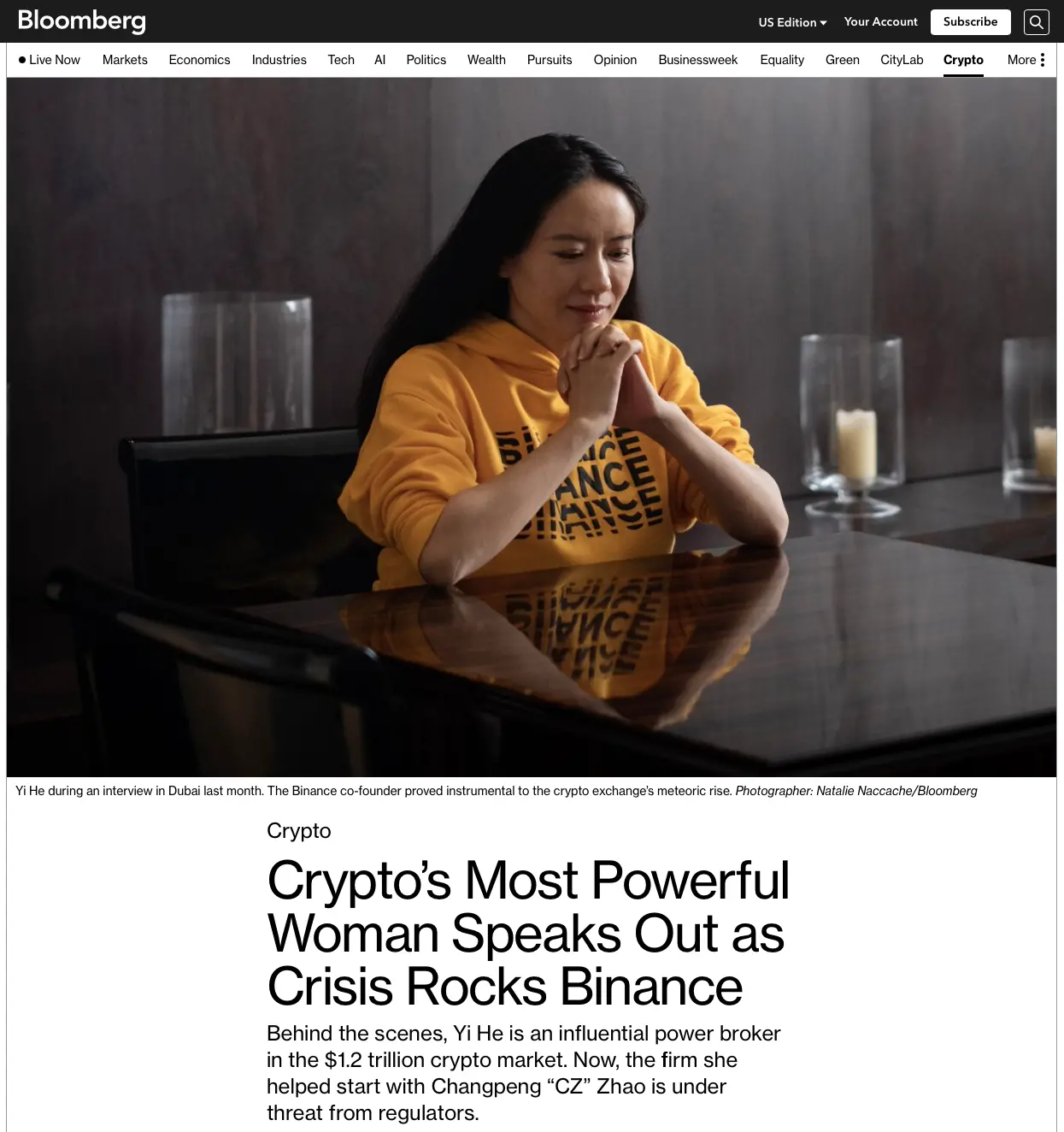
Earlier this month, the SEC successively sued Binance and Coinbase, categorizing multiple mainstream cryptocurrencies as securities, causing the crypto market to once again fall into turmoil. According to Nansen data, within 24 hours of the news of the SEC lawsuit, a total of over $3 billion worth of crypto assets were withdrawn from Binance internally, with a net outflow of approximately $1.43 billion. Subsequently, Binance.US was also targeted, with the SEC applying to freeze its assets and announcing the delisting of multiple trading pairs within a day, followed by news of executive resignations. Faced with the FUD brought about by the regulatory crackdown, He Yi immediately stepped forward to respond in the community.
Western media reported on this regulatory bloodbath in great detail, and He Yi, who continued to speak out, became a target. In the interview article, Bloomberg made a big deal about Binance Labs and the listing department led by He Yi, criticizing Binance's management chaos and lack of transparency compared to traditional finance. In Bloomberg's eyes, He Yi is the "single point of failure" for Binance and the "shadow dictator" of the crypto market.
And this is not the first time this year that she has been frequently seen in the community. In May, Binance faced fierce criticism from the community due to the poor quality and performance of projects launched on Launchpad, with words like "girlfriend coin" and "lack of recognition" appearing in almost every tweet related to Binance. During this time, it was still He Yi who replied to every tweet from early morning until one or two in the evening, some even engaging in direct "online battles".
The last time He Yi publicly engaged in such exchanges was four years ago. Newcomers who just entered the industry and saw He Yi on Twitter in May might think she has a bad temper, but four years ago, in the WeChat group, the "big sister" was not used to your quirks at all, whether it was reasoning or arguing, she remained unruffled. In 2019, in order to promote the newly launched contract product of Binance, He Yi engaged in scenes of heated exchanges with "friendly competitors" such as Huobi and OK in the WeChat group, which was one of the few memories for many "old leeks" in that year of extremely flat market.
Four years ago, He Yi was more influential in the crypto industry than CZ. But Western media did not know this. CZ was the only "rock star" in their eyes, and in 90% of the reports about Binance, only CZ's name appeared. He Yi did not receive such treatment, and with her limited English, after transitioning to the international market for Binance, she gradually faded from the media's spotlight and became less known to newcomers in the industry. But she always stood up first in the face of FUD and crises in Binance, using straightforward and daring responses to remind everyone: in the crypto industry, you are still the same "big sister".
The Big Sister of the Crypto Industry
He Yi, originally named He Ying, was born in 1986 in a remote village in Sichuan Province. Because both of her parents were teachers, while children of the same age were still in kindergarten, He Yi had already started first grade. At the time, He Yi, at the age of five, seemed out of place on the campus, spending most of her time at home reading her parents' various books. Despite not being able to play with her classmates, He Yi always ranked first in exams.
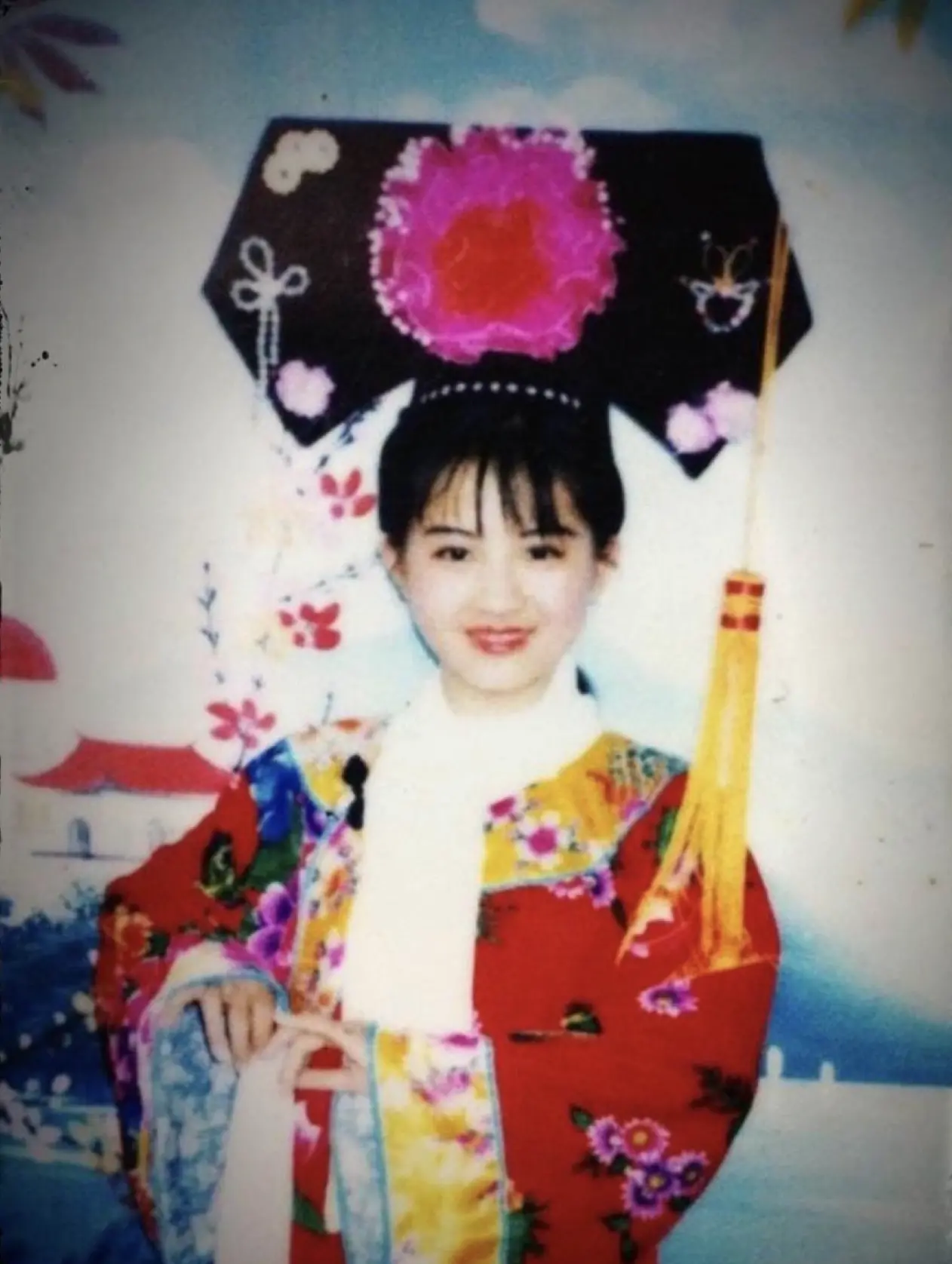
11-year-old He Yi
At the age of 16, He Yi worked in beverage promotion and could earn 1,000 yuan a month. At 18, she worked as the manager of a home goods store for two months, handling accounts and personnel. In 2006, at the age of 20, He Yi pursued a master's degree in counseling psychology in Beijing. After obtaining her qualification certificate, she found that even the top psychological experts in China did not have a good quality of life. "The cultural attributes of China determine the limitations of psychological treatment, and it is difficult to develop to the level universally recognized abroad in a short time." He Yi understood very well that where there are people, there is a world, and where there is a world, there is psychology. After working as an assistant counseling psychologist for a period of time, He Yi dropped out and went to Lijiang alone.
Coincidentally, the school where her friend was located was recruiting class teachers, with no specific requirements, just the ability to endure hardship. So He Yi volunteered to go for an interview. After talking with the department head and the school principal, He Yi became a class teacher at the university. She later recalled, "My sense of responsibility and my ability to communicate and manage young people made great progress during that time." At that time, He Yi managed students from the art department, most of whom were unruly, but they respected He Yi. Once, when a student skipped class, He Yi kicked open the door of the male dormitory and brought the truant student to the classroom.
"Chinese New Year red envelopes!"
In 2012, He Yi's life reached a turning point when a friend who worked as a director suggested that she try being a host. During the final round of interviews, the sponsors and management of the TV program asked the candidates to talk about their strengths. He Yi's exact words were, "I have a background in psychology, so I have strong empathy and can communicate well with different people. I have studied makeup, so you can save money on a makeup artist. I don't ask for much in return, you can pay me whatever you want."
And so, she became the outdoor host for Travel Channel's "Beautiful Destinations" and "How Far Can You Go", and later went to Beijing TV to host "New Discoveries in Beijing". However, working at the TV station was not all about the spotlight and beautiful scenery. After more than a year, traveling all over the country with the program, sometimes trudging through knee-deep mud or camping in the rain at night. Another time, He Yi recalled her experience as a travel host on the show: "When we were crossing the mountains in Qinghai, there was no water, no electricity, and no signal. As it was getting dark, I got separated from the rest of the team. You could hear wolves howling in the distance, and the sound of the melting snow on the mountains nearby."
Actually, He Yi's courage and perseverance were already evident at this time. Of course, what made He Yi successful was not just her resilience in adversity, but also some pursuits she always adhered to. At that time, many popular hosts liked to socialize with directors or friends in the industry, but not He Yi. She always hung out with people from the entrepreneurial circle, listening to them talk about investments, projects, and entrepreneurship every day. "What I really want to do is entrepreneurship, to create something different," she said in a later interview.
In November 2013, after Bitcoin quickly dropped from just over $1100, OKCoin, which had just started, was preparing to hold a Bitcoin red envelope event during the Spring Festival to liven up the market. At that time, OKCoin investor Maigang approached He Yi and asked if she could help distribute a red envelope and promote it for free in her WeChat circle. He Yi immediately searched the internet for information about Bitcoin, and after some understanding, she helped OKCoin distribute a red envelope on her WeChat circle with the message "Chinese New Year red envelopes!"

During the Spring Festival, to thank those who helped distribute the red envelopes for OKCoin, Maigang gathered everyone together and organized a gathering of young Chinese angels. It was at this gathering that He Yi met OKCoin's founder, Xu Mingxing, for the first time. The two of them talked about blockchain and Bitcoin at the gathering, and Maigang suddenly said, "Mingxing, isn't your company looking for someone to do marketing? Isn't this perfect?" Xu Mingxing was excited and invited He Yi to visit the company when she had time, to which He Yi agreed.
The second week after the gathering, He Yi went to Xu Mingxing's company. They had a brief chat downstairs, and after Xu Mingxing introduced the company's situation and his personal background to He Yi, he offered her a salary of 400,000 yuan on the spot. He Yi, who was curious about this new world, accepted it on the spot, saying, "I had a very happy chat with Mr. Xu, and he offered me the job without even discussing the price. After the Spring Festival, I went to report for duty."
So in March 2014, He Yi became the Vice President of OKCoin, responsible for brand building and marketing. When she joined OKCoin, He Yi started with public relations, then moved on to event planning, and later took over customer service, quickly getting the hang of the entire process.

In early 2014, the founder of Yibite, Chongge, visited OKCoin. He later recalled the office environment at OKCoin: "OK Group was in a simple office building, with a small office on the mezzanine floor, and a large plastic sign at the door that read OK EX. At that time, Xu Mingxing was upstairs, and He Yi was downstairs. When working overtime, she liked to wear a black outfit, like a big sister, and they worked day and night."
According to many employees, during He Yi's tenure at OKCoin, she led the team to complete turnarounds in public relations crises multiple times. It was during this time that He Yi earned the nickname "Big Sister of the Crypto Industry". In her own words, "I asked myself what kind of person I really wanted to be. I hoped to be someone who could influence the world's development, at least to participate in social progress." Perhaps what attracted He Yi was not the cryptocurrency industry itself, but the sense of mission she had always given herself.
What really made most people aware of the OKCoin brand was the reality show "The Winner Is" on Tianjin TV that He Yi participated in later. He Yi appeared in front of the camera again as part of the "BOSS Team". Her sharp words and witty yet approachable demeanor made many people aware of her and the OKCoin brand behind her.

In April 2015, under He Yi's leadership, OKCoin aired an advertisement on the main screen of Times Square in New York, with the message "Bitcoin is here, OKCoin is here, Everything will be OK!" The news was reported by People's Daily, and OKCoin's trading volume soared, successfully capturing 60% of the domestic Bitcoin trading volume.
Before this, OKCoin had already gained exposure in China. In 2014, He Yi represented OKCoin for interviews with magazines such as "Jia Ren", "Caijing Tianxia Weekly", and "Blog Tianxia". At the end of the year, OKCoin became the first cryptocurrency trading platform to appear in the high-end magazine "Fashion Bazaar", with the editorial team describing it as an unstoppable new force and giving it several pages of coverage. At the time, the media referred to OKCoin as the "most fashionable internet finance company" in China.
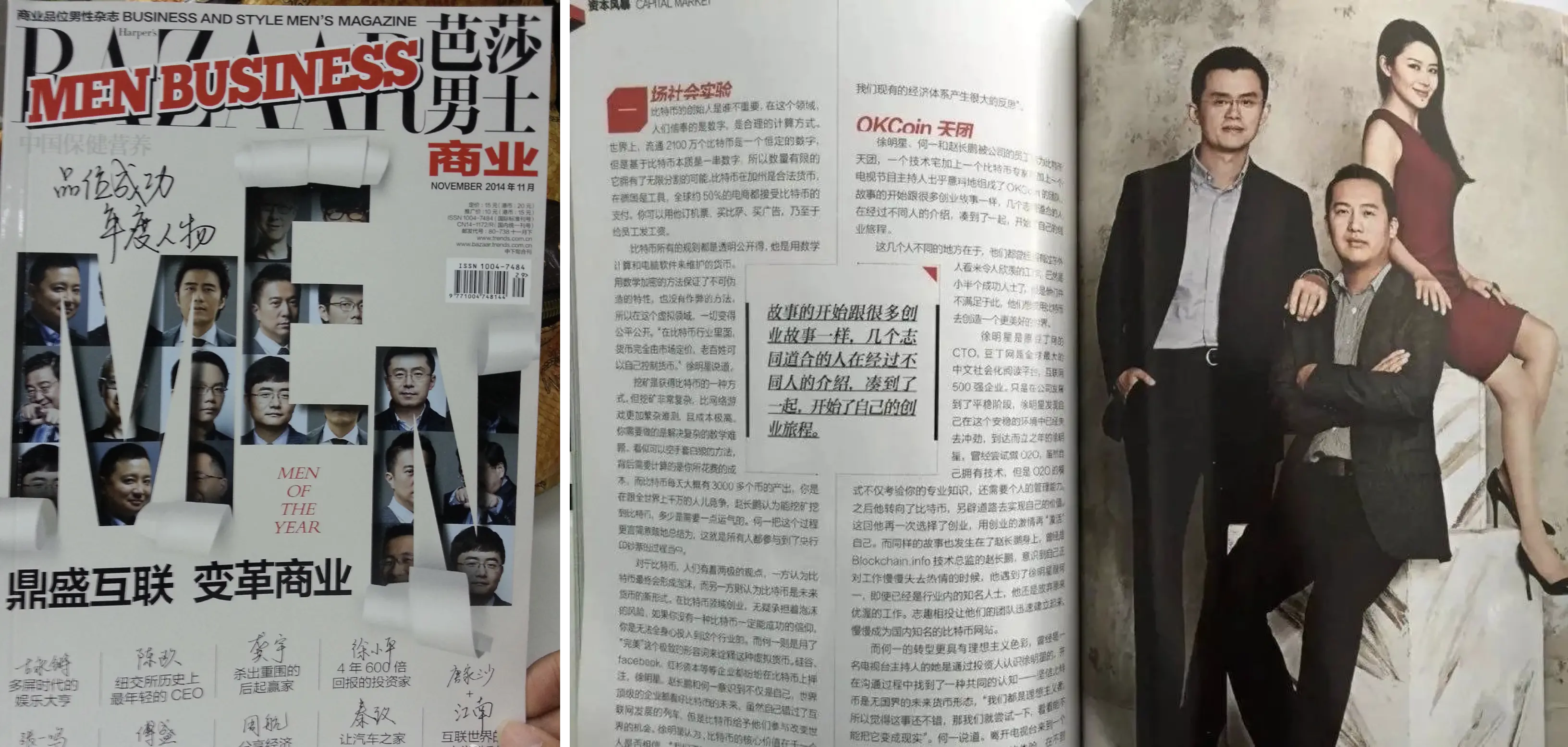
It is worth noting that in the "Fashion Bazaar" photo of the OKCoin "team", there was an additional person next to Xu Mingxing. This was another major achievement of He Yi during her time at OKCoin, as she brought CZ to OKCoin.
In 2014, Zhao Changpeng was just a Canadian technology returnee, serving as the CTO of the cryptocurrency market website Blockchain.info. Once, when He Yi was organizing an event for OKCoin in Hangzhou, CZ was a guest. After listening to CZ's sharing, He Yi admired his talent and asked for his WeChat contact after the event. Later, when He Yi wanted to advertise for OKCoin on Blockchain.info, she approached CZ for a discount, but CZ told her, "We don't offer discounts for our ads." He Yi was even more impressed by CZ after being turned down. She believed that he did not let personal feelings influence his decisions and was very professional. She then introduced CZ to Xu Mingxing and brought him into OKCoin.
CZ did very well after joining the company, managing the development of all products in addition to being responsible for the basic infrastructure, custody, and security of on-chain transactions. Due to his good English, CZ was also responsible for promoting the overseas market. This formed the "crypto industry's iron triangle" that resonated throughout the industry in 2014.
Of course, it now seems that this triangle is not as "iron" as it seemed. In the entrepreneurial circle, there is only room for one leader, and both CZ and Xu Mingxing have technical backgrounds, often leading to differences in decision-making logic and cultural background. At the end of 2014, CZ signed an agreement with his former employer, Blockchain.info, agreeing that OKCoin would be responsible for operating the Bitcoin.com domain for 5 years, with all advertising revenue during this period going to OKCoin. However, due to poor operational results, OKCoin wanted to terminate the cooperation early. But the owner of Bitcoin.com, known as "Bitcoin Jesus", Roger Ver, believed that OKCoin should pay compensation monthly, leading to several months of economic disputes between the two parties.
To Xu Mingxing's surprise, CZ took a strong stand with Roger Ver in this dispute, accusing OKCoin of violating professional ethics, forging his signature for bank transfers, and other issues. Subsequently, OKCoin immediately issued a statement, claiming that CZ not only forged the contract but also fabricated lies to attack OKCoin. Ultimately, this war of words ended with OKCoin firing CZ. As the person who recommended CZ to the company, He Yi was also caught in the middle of this controversy, feeling torn. In the second half of 2015, He Yi quietly bid farewell to OKCoin.
"Starting Over at 30"
After leaving OKCoin, apart from holding some Bitcoin, He Yi had only 100,000 yuan in cash. During this time, many peers extended olive branches to her, saying, "You can ask for whatever salary you want," but He Yi, who had a non-compete agreement, resolutely rejected them all. Even after achieving great success at OKCoin, many people still saw He Yi as a "trophy" of the crypto industry. When inviting her to join their companies, many were more interested in the name "He Yi".
But Zhang Ling, who was the investment manager of KaiPeng HuaYing Investment Fund at the time, watched He Yi build the OKCoin brand in less than a year and believed that He Yi had great potential. She recommended He Yi to Han Kun, the founder of Pionex. At the end of 2015, Pionex completed its Series D financing, raising $200 million, but the company still did not have a marketing department. Han Kun invited He Yi to join Pionex to oversee the entire marketing business. Shortly after, He Yi became the Vice President of Pionex, with an annual salary of one million yuan and stock options.
"You only want to reap rewards without putting in the effort, that's not possible. During my time at OKCoin, I was always using He Yi's name to speak out, using the credibility of that name to guarantee the company. After leaving, I hope to work behind the scenes and use professionalism to achieve all strategic goals," said He Yi after leaving OKCoin, as she began to explore behind-the-scenes work.
Many people may not be familiar with Pionex, but at the time, the popular live streaming platforms such as Yizhibo, Xiaokaxiu, and Miaopai were all products under their umbrella, and the success of these products was directly related to He Yi. In 2016, South Korean actor Song Joong-ki became popular in China with "Descendants of the Sun", and his influence and large fan base were a big cake that every live streaming platform coveted. Under He Yi's leadership, Yizhibo managed to sign Song Joong-ki amidst numerous partnership invitations. A few months later, the official account of Song Joong-ki on Yizhibo had over 160 million video views, with a peak of over 3.5 million simultaneous viewers during a live broadcast, propelling Yizhibo to fame.
Whether in the crypto industry or in internet technology companies, the logic of the market and the logic of understanding users are the same, and He Yi applied the unchanging points in industry changes with great skill. "Whether it's live streaming, short videos, or videos, it's not about fighting alone anymore, but competing on the same starting line, and that starting line is called: capturing users' time," said He Yi, leading the team in the live streaming market as the company's Vice President, and played a key role in the rise of Yizhibo, Miaopai, and Xiaokaxiu. Later, Yizhibo even became the preferred platform for live streaming among people in the crypto industry.
One evening in August 2017, "Bao Er Ye" Guo Hongcai was doing a live broadcast on the Yizhibo platform when he suddenly exclaimed, "Welcome back to the crypto industry, the beautiful He Yi!" Those watching the live broadcast were shocked and quickly opened the news to see the announcement of He Yi's departure from Pionex.
In 2017, as Pionex was thriving, He Yi decided to bid farewell to the company and its "boss" Han Kun. On August 8, she officially announced her departure from Pionex with a "resignation manifesto" titled "Starting Over at 30!". In the article, He Yi wrote, "I like leading a group of people to conquer and celebrate victory, and I like watching subordinates grow and take on responsibilities, these are the things that make me happy." So, the "disappeared" big sister of the crypto industry decided to return in a high-profile manner, "Starting from scratch, from the beginning," and once again teamed up with CZ to build Binance as the CMO.
Many newcomers to the industry may not be aware of the huge impact of the news of the "big sister's return" in the crypto industry at the time, but in a report by Jinse Finance, we can catch a glimpse. The article begins with: "Some time ago, I heard that a mysterious guest who is about to take on an important position at Binance (the full name of Binance is Binance Blockchain Asset Trading Platform), is hailed as 'a pivotal entrepreneur in the tech industry, the mastermind behind several well-known internet products'… At that time, when I saw the introduction of Binance's guessing game, I was really shocked, and my mood also became tense."
In July 2017, Binance launched its own platform token BNB at a price of 1 yuan. However, shortly after the launch, BNB fell below the issue price, with one BNB worth only 50 cents. At the time, Binance was heavily criticized. He Yi later recalled that it was the most stressful period for CZ, as he lost 10 kilograms in just three weeks. After the news of He Yi joining Binance was announced, the price of BNB rose sharply. BNB and the newly launched BTM token on the platform immediately saw a surge in trading volume, ranking among the top 10 in trading volume globally. Half a month after He Yi joined, the price of BNB surged from $0.149 to $2.57, an increase of over 20 times.
Facing questions from the media, He Yi said, "Joining Binance was a very cautious decision," and she believed that she would turn Binance into a "truly world-class trading platform." However, from CZ inviting He Yi to dinner, showing her the whitepaper, to He Yi joining Binance and reversing the decline of BNB, the entire process took less than a month. Later, she also said in an interview that she did indeed "enter the scene running and brought her own rations."
These "rations" were not just her work experience, but also the assets accumulated by He Yi over the years. After investing in the company, He Yi had less than 1 million yuan left, so she decided to buy Binance Coin. "My logic was, if you don't believe in something yourself, why should you expect other investors to buy it?" Even now, He Yi has hardly sold any of her BNB.
He Yi brought her operational experience from Yizhibo to Binance, using live broadcasts to give away coins and cars, which seemed straightforward but effectively attracted a lot of traffic to Binance. On August 22, He Yi hosted a live broadcast with Justin Sun, discussing the TRON project. During the live broadcast, He Yi initiated a TRON purchase activity, and in just 53 seconds, 500 million TRON tokens were sold, establishing TRON as the "first ICO project" in the second half of 2017.
On the 25th, He Yi successfully secured a gold endorsement for Binance, as Binance signed an investment intention agreement with Sequoia China. The agreement stipulated that Sequoia China would invest approximately 60 million yuan in Binance's Series A financing, holding a 10.7% stake, and also agreed to provide Binance's Japanese branch with a bridge loan of approximately 30 million yuan. Binance's valuation soared to 500 million yuan.
But just as Binance was about to reach its peak, it encountered a "disaster day" in the crypto industry a week later. On September 4, 2017, the government's seven ministries and commissions launched a heavy blow against the chaos in the cryptocurrency industry, announcing the cessation of all token issuance and financing activities, including ICOs. With this news, Bitcoin plummeted, and everyone thought that cryptocurrencies were doomed. This was less than a month after He Yi joined Binance.
Of course, for Binance, "September 4" was a rare "overtaking" opportunity. Binance had only been doing coin-to-coin trading, and the company's servers were registered overseas. CZ himself was also a foreign national, so taking an international route was a natural choice. "Since China cannot do it at the moment, we decisively withdrew from the Chinese market and focused on international business."
What left a deep impression on many investors at the time was Binance's "market price refund" for Chinese investors. According to regulations, if the issue price was one yuan, then during the refund, only one yuan needed to be returned, returning the principal to the investors. However, Binance decided to refund based on the market price of BNB. After a round of price increases, the price of BNB was still around 6 yuan after "September 4", and many projects involved ETH. Binance also refunded based on the market price of ETH, subsidizing a large sum of money. Although Binance suffered a loss, it gained the trust of the industry.
Afterward, He Yi faced pressure and promoted Binance on social media, recommending "Teacher Tony's" "overcoming the Great Firewall" tutorial to users. On the other hand, she directed Binance to take the lead in Japan, filling the gap left by domestic trading platforms. At that time, many users from domestic platforms such as OKCoin and Huobi flocked to Binance, and Binance once again began to surge ahead.
On December 15, 2017, four months after He Yi joined Binance, Binance announced its operational data: top three in global trading volume, 24-hour trading volume exceeding $21 billion, and a 100% increase in the market value of BNB. On December 18, Binance's daily trading volume exceeded $3 billion, ranking as the world's number one cryptocurrency exchange. On the 19th, Binance's user count exceeded 2 million, and in less than a month, it soared to 5 million.
On January 10, 2018, Binance's trading volume exceeded $10 billion. In February, CZ appeared on the cover of Forbes magazine. He Yi achieved what she had boasted about when she joined Binance in just six months.

After joining Binance, He Yi's journey was not smooth sailing. On the night of March 7, 2018, Binance was hacked, and many users found that the tokens in their accounts were traded for Bitcoin at market price, causing a significant drop in the prices of most tokens. After causing panic selling, the hackers used the stolen Bitcoin to buy a token called VIA, causing the price of VIA to skyrocket over 110 times in a short period, which in turn led to a more than 10% drop in the price of Bitcoin within an hour.
Following the incident, Binance was criticized for "guarding the thief and blaming the hacker." He Yi once again stepped forward, clarifying the situation to the media and answering questions from everyone in the communication group. "He Yi protected Binance like a mother protecting her calf. At least in her role as the public face of Binance, she did a great job," said a media professional in the industry. In April, the Hong Kong High Court rejected Sequoia China's injunction against Binance, and the investment dispute between Binance and Sequoia China made headlines again. He Yi once again stepped in to ease the situation, stating that it was a "conflict between the emerging industry and the past financing model, as well as a conflict between Chinese culture and Western culture."
Read more: "Zhao Changpeng sues Sequoia Capital subsidiary and demands compensation"
Four years ago, He Yi was frequently quoted in media interviews. When asked about the criticism that Binance's listing fees were all donated, she said, "It's Binance's freedom to donate the listing fees wherever they want." Regarding the definition of Binance's ICO as illegal, she said, "CZ indeed did not specifically consider China, it's a manifestation of our lack of Eastern wisdom." Of course, there were also responses to the lawsuit with Sequoia. In 2018, according to statistics from Run Finance, the Baidu search volume, media coverage, and fan base of the founders of cryptocurrency exchanges, He Yi and Binance ranked first, with exposure far exceeding their competitors. This is the influence of the big sister in the crypto industry.
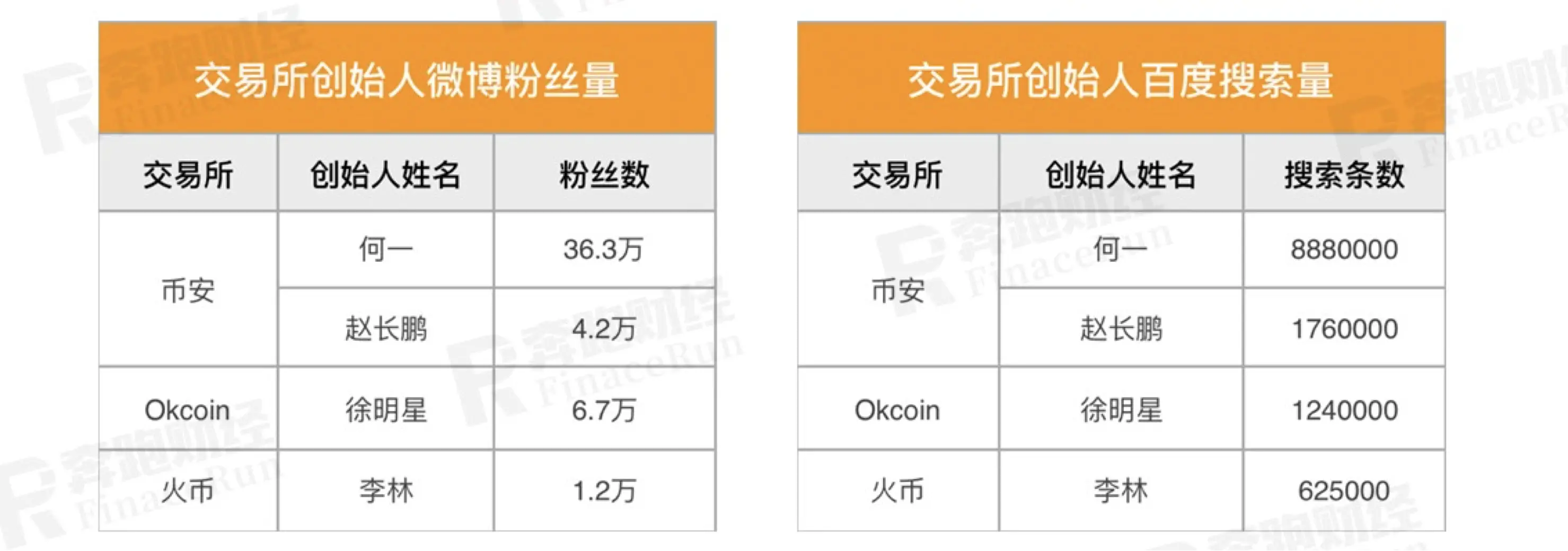
"After the '94 incident,' under the regulatory pressure from various countries and the high discrimination from Western media, many domestic exchanges, in order to continue their business, began to downplay their 'Chinese elements.' It became increasingly difficult to find videos of CZ speaking Chinese, and Xu Mingxing even made up his mind to 'no longer speak Mandarin.' But He Yi's English was not good, and in an interview with Bloomberg, she revealed that her English proficiency was an important reason why she did not become the public face of Binance.
As Binance expanded internationally, He Yi gradually retreated behind the scenes, and CZ took the spotlight. Now, even outsiders know that CZ is the "richest man in the crypto industry," but if you didn't enter the industry a year and a half ago, you wouldn't know how glorious He Yi was back then.
But today, He Yi is still working hard for Binance. Her passport has many stamps from different countries, and there are fewer blank visa pages. He Yi describes her work as "having the world as her home," saying, "When you are far away from Chongqing noodles, crayfish, and nine-grid hotpot, you will still miss them, especially your stomach, which will have a strong homesick feeling." Does the behind-the-scenes He Yi still have value? He Yi has answered this question herself. In an interview, she revealed that many people have tried to poach her, but most of them were only interested in the name "He Yi," not her value. "For the past two years, my work has been mostly behind-the-scenes work, positioning and strategizing from the background. Lao Zhao (CZ) understands the value of He Yi as a partner."
Binance Partner
In May 2018, He Yi was asked in a media interview whether Binance was considering issuing financial derivatives. At that time, the cryptocurrency market had just entered a bear market, and there was no clear understanding of the industry's cycle, and the market sentiment was not too bad. When asked about launching derivative products, He Yi's response was, "If it's just about making money, it's not meaningful for Binance."
He Yi explicitly stated that Binance has always been very cautious about financial products. She jokingly said, "Futures leverage provides a mechanism for shorting. Both CZ and I are staunch holders, we only have coins and no money. So, in providing a mechanism for shorting, there is a bit of selfishness, we don't want the shorting mechanism in this industry to be too easy."
However, by 2019, Binance was really in a hurry.
In May, Binance, which had always been restrained in its business, quickly launched contract and OTC products. That year, Binance not only launched Binance.US to provide services to users in the United States, but also announced that it would re-focus on the Chinese market and increase its personnel in the region.
Behind Binance's series of actions was the stock game phase in the cryptocurrency market. He Yi summarized two market trends: a decrease in trading activity and a stronger activity in mainstream coins, while altcoins were declining. For exchanges, the worst thing in a bear market is not the decline, but the lack of a clear end to the sideways movement. Retail investors are stuck and unable to move, and project teams are either making a fortune and leaving or lacking funds to manage their market value. The "cold winter" has frozen a large part, and the entire industry's liquidity has dried up. Without the profit effect, exchanges have become deserted.
The reason for entering the contract market was also to amplify volatility and increase the trading frequency of individual users. With OKEx and Huobi subsequently launching their contract businesses, the "homogeneous competition" among the three major exchanges was fully underway.
The head-to-head competition in business quickly led to a "war of words" between friendly competitors. In October, Xu Mingxing suddenly clashed with his former comrade He Yi, posting on Weibo that He Yi and CZ were in a romantic relationship within the company, lacking professional ethics and partnership spirit. At that time, CZ was already a married man, and He Yi quickly denied the romantic relationship with CZ and counterattacked.
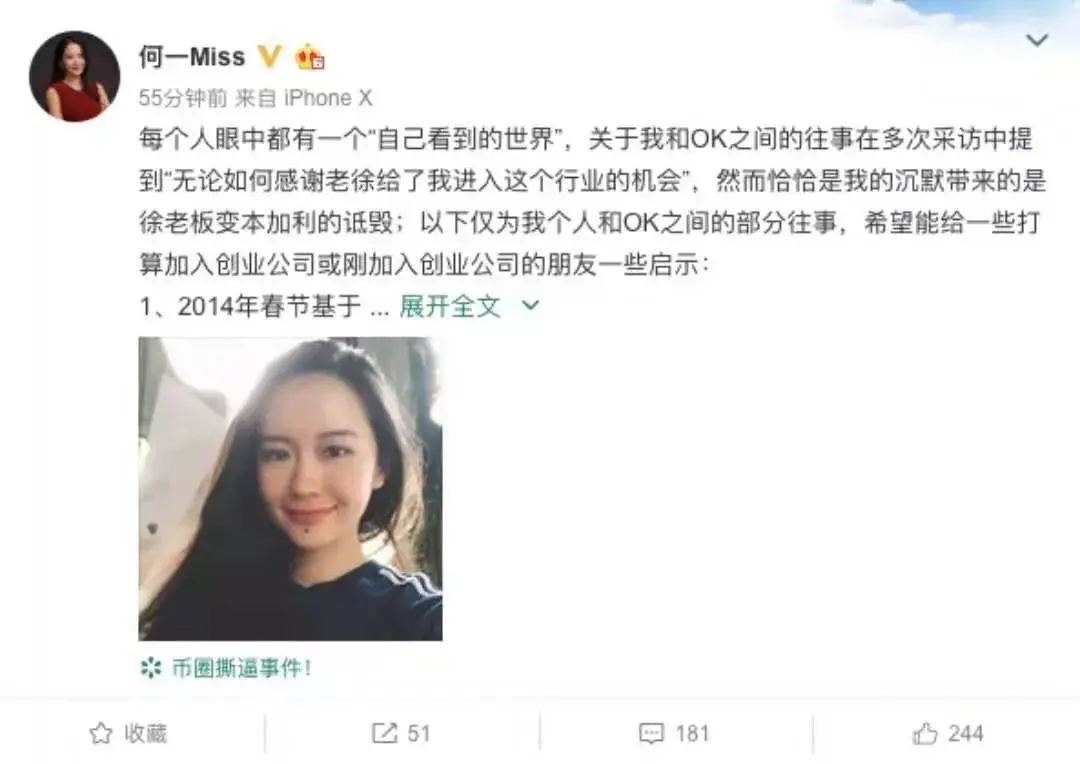
When asked about her views on the escalating friction with peers, He Yi's response was as tough as ever. She bluntly stated that it was the competitors who "called Binance back," saying, "Competitors always criticize Binance online, sending us so many PR articles, and when Binance has a problem, they come out to mock us. I just feel that since they have such high expectations of us, then we should return to China and do some market work. If we don't fight back in this battle, we won't be able to stand up for ourselves, and it will make me look weak."
2019! 2019!
Looking back now, 2019 may have been a turning point in Binance's six-year history. In that year, Binance broke away from the consumption war with many exchanges and began to gradually distance itself from its peers.
Many people believe that Binance's breakthrough in 2019 was achieved through the innovative IEO model. In January, leveraging its overseas advantage, Binance announced the relaunch of Launchpad and became the first to start the IEO journey. The first project was Bittorrent (BTT) by Justin Sun, which was sold out in less than 13 minutes after going live. Looking back now, the Bittorrent project may not have much to talk about, but at that time, in a period of no fluctuations and hope, the impact of a project that went up 20 times on the market was immeasurable.
In fact, Binance proved to be the most successful player in the IEO space, not only attracting a lot of attention but also pulling users away from other platforms. Seeing Binance's breakthrough, Huobi and OKEx immediately joined the "IEO club." In March, Huobi launched its first project, TOP, which was sold out in just 19 seconds, and the opening price was over 20 times the purchase price. With the leading exchanges driving the market, large and small trading platforms in China rushed into the IEO trading market. In response, CZ confidently replied, "Welcome to other exchanges to copy us."
However, in reality, the ultimate breakthrough for Binance was not just the new IEO model, because by May and even the end of the year, the "big three" were still fiercely competing for the contract market. CZ's confidence did not only come from the victory of IEO. In 2019, Binance's efficiency and progress in all aspects could be described as "terrifying."
After the IEO wave in January, Binance launched Binance Smart Chain (now BNB Chain) in February. In May, the first DeFi project CRED was launched on the chain, and Binance also started leveraged and contract trading, officially entering the derivatives market. In June, Binance Labs announced the incubation of 13 new projects. In July, Binance.US was established. In September, Binance successively launched BUSD, financial products, and staking platforms. In December, JEX was acquired, and Binance Cloud was launched, along with the landmark event of investing in FTX.
This is just a partial display of Binance's work and products in 2019. In the extreme cold of the market, Binance pursued multiple business lines, trying every means to increase trading volume and fund inflow. Behind each of Binance's business lines, there is almost always the shadow of He Yi. In that year, Binance's business progress gradually reflected in the company's profits.
Someone calculated Binance's profits based on the fiat value of BNB destroyed in the third quarter of 2019. Despite the decline in cryptocurrency market trading, Binance's profits continued to increase in the third quarter of 2019, even by around $10 million more compared to the second quarter. He Yi gave three reasons for this. First, Binance experienced a theft incident in the previous quarter, which led to a decrease in profits due to the losses incurred. Second, some projects early invested in by Binance unlocked tokens in the third quarter, yielding a certain investment return. Third, significant structural optimizations were made in terms of costs.
He Yi once revealed that the fees paid to third-party service companies by Binance each year were astonishingly high. For example, in terms of cloud services, the amount paid to Amazon each year might be second only to those of the world's leading companies. In 2019, the team led by He Yi made significant iterations to the solutions provided by suppliers, reducing costs by millions of dollars each month.
These achievements were not unfounded. Looking back, He Yi and Binance had already begun laying the groundwork for their breakthrough in 2018.
In an interview in October 2018, He Yi said, "The most powerful opponent is actually oneself. Binance also needs to defeat itself in order to evolve." At that time, the blockchain industry's foundation and ecosystem were not yet mature, but Binance decided to experiment in the upstream, midstream, and downstream of the industry in various directions.
In the upstream, Binance Labs was established, initially focusing on industry investments, but later He Yi realized the need to establish a parent fund to attract traditional financial capital into the industry. In the midstream, Binance Smart Chain was created to provide incubation space for projects in a more native encrypted way. In a 2018 interview, Ella, who was in charge of Binance Labs at the time, revealed the launch plan for BSC. There were also extensions in the downstream of the industry, such as Binance Info and charity.
In 2018, Binance also made an acquisition, purchasing Trust Wallet.
This was Binance's first public acquisition. He Yi recalled that when they found Trust Wallet, the team was already planning to launch a token, so the initial impression was not very good. However, after using and experiencing the product, He Yi quickly decided to have another conversation with the team. In August, Binance announced the acquisition of Trust Wallet, and shortly after, He Yi's assistant Eowync took over as the team's CEO. Today, Trust Wallet's market share on mobile has surpassed that of MetaMask, and the team has still not launched a token.
In fact, Binance has many subsidiary businesses, but almost none of them have launched a token. He Yi believes that these products have a promising future. She has also said that, overall, focusing on value creation is most important. "The image of the crypto industry is not that of a greedy monster. I hope that one day, this industry will truly grow and gain recognition from the public and society, achieving mutual benefit and win-win."
This may sound like grandiose rhetoric, but He Yi has indeed achieved everything she has boasted about in the past. Binance Labs under He Yi's leadership has indeed made many "faith-based investments."
Yibo Ling, Binance's Chief Business Officer, once said, "We buy and hold, that has been our strategy for the past few years. Except for a few exceptions, we have not cashed out. The most compelling evidence is Binance's unrealized LUNA and the massive MATIC on-chain holdings. During the market's most panicked times last year, Binance launched a $1 billion 'industry recovery fund' to support struggling crypto projects and companies. According to Binance's 2022 year-end review report, Binance Labs has invested over $500 million in the Web3 field, making it one of the few institutions in the industry that continues to invest.
At Binance, apart from product technology, He Yi is involved to some extent in almost every other business. Some have asked about He Yi's role in the company. She summarized it as "CZ helps the company find direction, and I help the company find better people." Some believe that He Yi has too much to manage, and she simply responds, "I am a partner in the company."
Binance Totem
After Binance shifted its focus overseas, He Yi became the most stable bridge between Binance and the Chinese community. Regardless of location or time, you can always find her. In the eyes of users, He Yi is the "chief customer service officer" of Binance, with the quickest response to messages, often active in various WeChat groups late at night, and personally sending red packets in the groups for Binance activities. In the eyes of passersby, He Yi is the "firefighting captain" of Binance, previously at the forefront of competition with rival products, and now the first to appear at various FUD scenes to debunk rumors.
Someone once asked He Yi about retirement. Her response was resolute: "In 2017, I wrote a paragraph: Everyone thinks that Binance's ICO is fundraising, but in fact, what you are raising is debt, and this debt may be lifelong."
Although she is called the "chief customer service officer," He Yi revealed that at Binance, apart from customer service, she is responsible for everything related to users. This includes branding, public relations, content, design, and user growth, such as user operations and event operations. Even Binance's major clients and local markets in various countries and regions around the world are under He Yi's responsibility.
In fact, in the crypto industry, few people are more deserving of rest than He Yi. This is not only due to her experience, age, status, and wealth, but also because she is already a mother of two. In the circle of billionaires, you hardly see a founder like He Yi, who insists on being on the front lines every day, understanding user needs and solving user problems in various communities. She often says that her work at Binance is only one thing: working for BNB holders.
Of course, He Yi's work is not just "working." In the eyes of Binance employees, He Yi is the "team architect" of this 8,000-person team. For He Yi, management has also become an art. "If someone in your team is not performing well, it is definitely the manager's problem, or it means you made a misjudgment about them from the start, which is a problem with your recruiting ability. Otherwise, it means you did not place them in the right position, which is a problem with your management."
When He Yi first joined Binance, she was responsible for the entire marketing department's work. In order to achieve zero-distance contact between the Binance brand and users, she gave the department a strict order: everyone must be customer service. She personally trained the entire marketing department and answered all user questions in all of Binance's user groups. In the early days of Binance, employees often worked until after 1 a.m., and He Yi also worked late into the night.
Under He Yi's guidance, the once underestimated "Binance Women's Team" gradually became a prominent presence in the Chinese community. Sisi has transitioned from community and customer service to half a product manager, collecting suggestions for Binance from the entire Chinese community. Qiqi, now known as Eva, works with VIPs and institutions, and Yingge is rallying for Binance Square. He Yi is practicing her goal of finding honest, capable, and passionate young people to build a "long-lasting foundation" system.
These translations are complete.
Even though BNB has risen from one dollar to over two hundred dollars, He Yi still feels the weight of responsibility on her shoulders. "Users hold your coins because they believe in you. It's great when it goes up, and everyone is happy. But if it goes down, people may not be as happy, and then you feel an even heavier responsibility on your shoulders."
From this perspective, if someone can do better in this position than He Yi, she is willing to "step down and let someone more capable take over."
It can only be He Yi
On June 18, 2017, while in the midst of entrepreneurship, Zhao Changpeng invited He Yi to dinner. She looked at the whitepaper and laughed, "They chose a very strange Chinese name, like a supermarket. I said, why not call it Binance?"
Six years later, Binance gave He Yi the following evaluation on its official website:
"Binance has grown into the world's largest cryptocurrency exchange, thanks to the business strategies led by He Yi and her team. She transformed Binance from a spot trading platform into a global blockchain ecosystem. To break through in the face of strong competitors and occupy over 60% of the market share, her strategic vision and talent strategy are crucial for any enterprise."
At this year's Token2049 in Dubai, He Yi once again became the most eye-catching person at Binance. At the event, she appeared in a black dress, calmly sharing Binance's past and future. On Twitter, WeChat groups, and friends' circles, there were numerous selfies of attendees with He Yi. Just like the name she gave the company, with He Yi at Binance, people can always feel more at ease.
When CZ steps back, people will still worry about Binance's future. Now, it seems that no one is more suitable for Binance than He Yi. Only she will reply to customers' ordinary and simple questions late at night, and only she will come out to counter FUD during turmoil. When asked about her annual salary at Binance, she said, "That's just pocket money, I haven't paid much attention to it." Perhaps, just like what she wrote six years ago, He Yi "likes leading a group to conquer and strategize, likes the moment of victory and celebration, and likes watching subordinates grow and take on important roles." These are the things that make He Yi happy.
"She looks pretty good." This was many people's first impression of He Yi, but they didn't know the tremendous energy this woman possesses. Six years later, the future of Binance still needs He Yi.
免责声明:本文章仅代表作者个人观点,不代表本平台的立场和观点。本文章仅供信息分享,不构成对任何人的任何投资建议。用户与作者之间的任何争议,与本平台无关。如网页中刊载的文章或图片涉及侵权,请提供相关的权利证明和身份证明发送邮件到support@aicoin.com,本平台相关工作人员将会进行核查。



